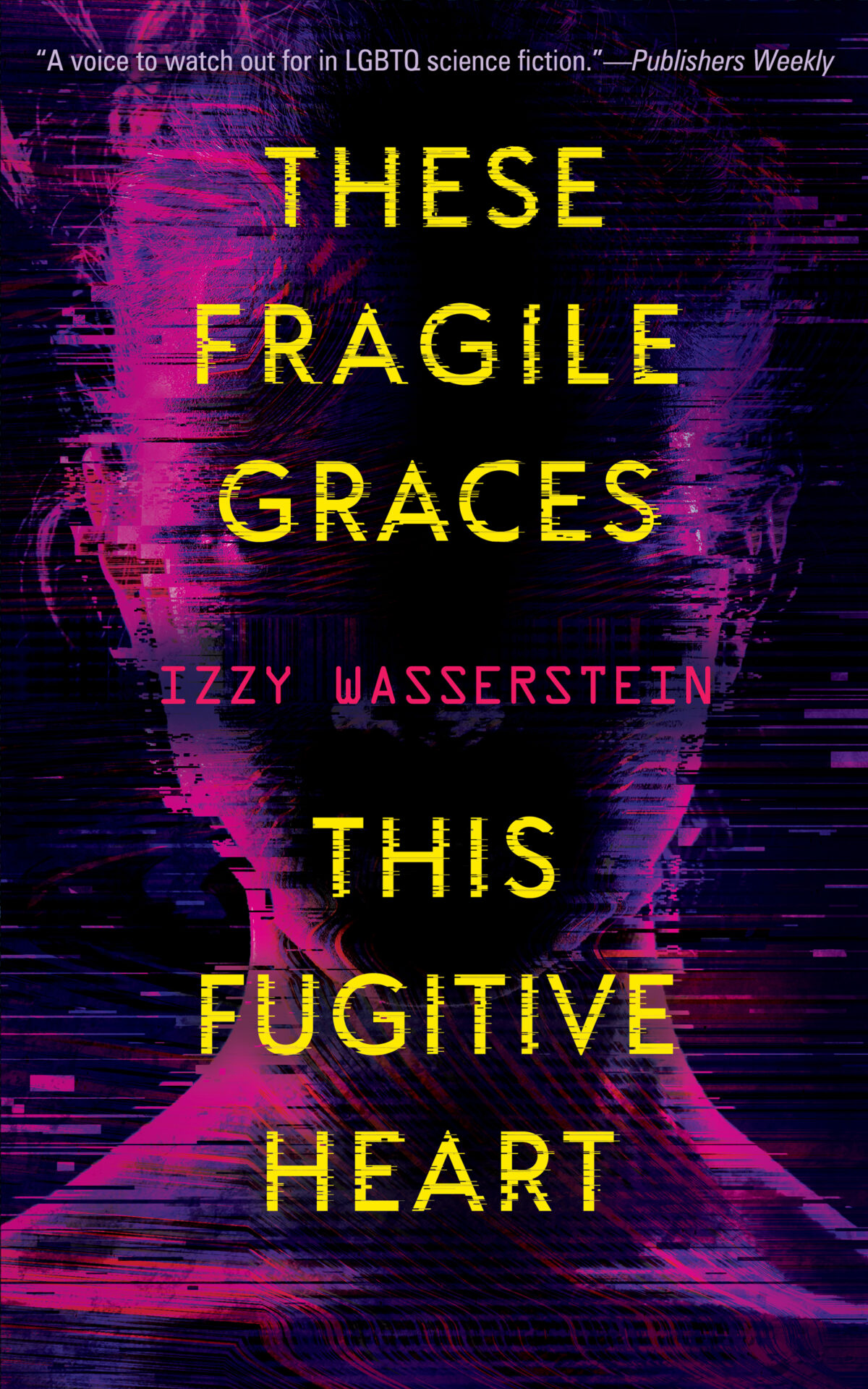
Izzy Wasserstein is joining us today to talk about her novel, These Fragile Graces, This Fugitive Heart. Here’s the publisher’s description:
Security expert Dora left her anarchist commune over safety concerns. But when her ex-girlfriend Kay is killed, everyone at the commune is suddenly a potential suspect. In the remains of Kansas City, which the government has all but abandoned, Dora knows there will be no justice unless she solves the murder herself.
But Kay’s death is only one of several shocking incidents. A strange new drug is circulating, people are disappearing, and a war between two nefarious corporations is looming. As Dora untangles a terrible conspiracy, she must also come face-to-face with assailants from her pre-transition past.
What’s Izzy’s favorite bit?

My favorite bit in my debut novella These Fragile Graces, This Fugitive Heart is a meeting. I never thought I’d describe a meeting as my favorite anything, but sometimes writing takes you places you never expected.
Don’t get me wrong: These Fragile Graces has plenty of excitement. There’s a murder mystery, gunfights, corporate intrigue, and even a spicy scene. But while I love writing action scenes, they’re not the heart of this novella. These Fragile Graces arose out of my reflections on the challenges of sustaining communities and the ways we can uplift or fail them (and that they can uplift or fail us).
First you need to know a bit about the book’s plot. (Some minor spoilers follow, but I’ll keep them very light.) Set in mid-21st Century Kansas City, These Fragile Graces, This Fugitive Heart follows Dora, a trans woman living in self-imposed exile from the anarchist commune she once called home. She’s sworn never to return, but when her ex-girlfriend Kay is murdered, Dora sets out to solve the murder, no matter how much harm she does to herself or the commune in the process. While she’s trying to make sense of what happened, she’s attacked by would-be-killers with connections to her past. She’s able to capture one of these foes, who calls himself Blue. Unwilling to kill Blue in cold blood, but knowing she can’t let him loose, Dora decides on a particularly desperate plan: she asks the commune to take him in.
Hence the meeting. It’s a tense one. It’s an understatement to say that Dora isn’t well liked by her former community, and her request comes dangerously close to asking them to be jailers, which is anathema to the commune.
A heated argument ensues. Really, a series of arguments, because her request cuts to the heart of the commune’s values. The community recognizes the need to keep tabs on Blue, but no one there wants to recreate prisons’ systems of power and harm. Because they’re anarchists, Dora’s request is something they have to discuss, debate, and decide on together. There’s no one in charge, no one to whom they can cede responsibility for making this difficult choice.
Dora is all too familiar with these arguments, since a furious disagreement with her community is the reason she left it behind. Despite this, she still respects the process and shares the community’s hatred of hierarchies. That means, in the end, all she can do is make her case and live with the result. Even if that means that her would-be-killer goes free, as Dora tells us in this except from the meeting:
“We don’t keep prisoners!” someone shouted, and a murmur of agreement
followed. Some fixated on what I’d done, others thinking maybe I had a point. They weren’t keeping poker faces. I had to give them a reason to say yes.
“I’m not asking you to lock Blue up. Just . . . keep an eye.”
“And if Blue decides to just walk out the door?” Turner asked. All eyes on him, then on me.
“Then I hope you’d warn me,” I said. What else could I ask? Shoot him? Lock him away? These were free people.
The choice the commune makes will have massive implications for Dora, for Blue, and
for the commune itself. It isn’t the first time Dora has found herself in conflict with the people who were once her chosen family, and it won’t be the last.
Even if Dora can find a way to solve Kay’s murder, other questions remain much harder to answer, questions about what is fair to ask of oneself and others, about what it means to truly take responsibility for your choices, and about how to make tough decisions in massively constrained circumstances.
That’s why I love the meeting so much. Because it’s not just a meeting, it’s a community doing the hard and necessary work of deciding what it will be and what it will do. Because none of us are free to abdicate our ethical responsibilities. Because being an anarchist—and being a person—requires us to make hard choices and accept responsibility for them.
These Fragile Graces, This Fugitive Heart is a cyber thriller and a murder mystery. It’s also a science fictional exploration of a community with utopian dreams in the heart of a dystopian society. But at its heart, it’s a book about the messy, fraught, essential work of cultivating our communities and ourselves.
And sometimes that work needs to be done in meetings.
LINKS:
BIO:
Izzy Wasserstein is a queer, trans woman who teaches writing and literature. Wasserstein was born and raised in Kansas, and she received her MFA in Creative Writing from the University of New Mexico. She is the author of dozens of short stories, two poetry collections, and the short story collection All the Hometowns You Can’t Stay Away From (Neon Hemlock Press, 2022). Wasserstein loves books, comics, horror movies, and slowly running long distances. She shares a home in Southern California with her spouse Nora E. Derrington and their animal companions.
